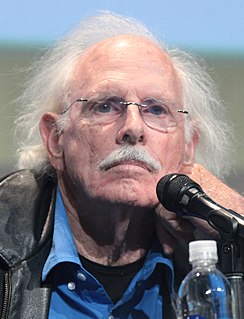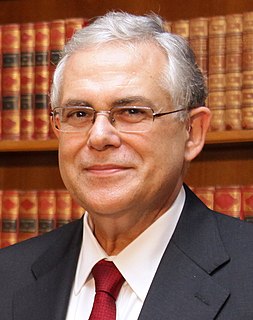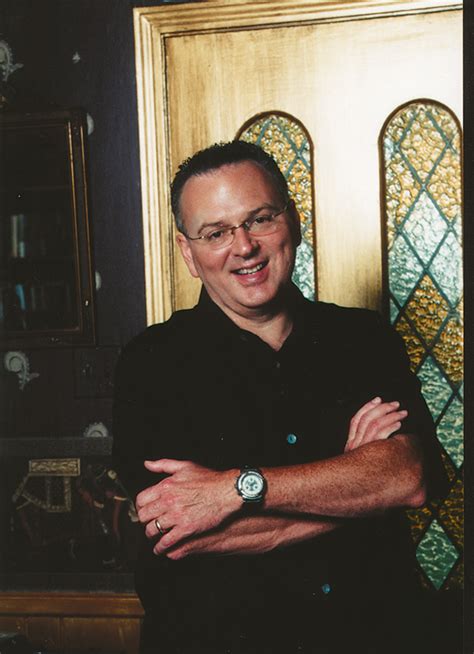Top 1200 Greek God Quotes & Sayings - Page 2
Explore popular Greek God quotes.
Last updated on December 18, 2024.
I did have the resource of having taught Greek mythology and the history of Western civilization, and you can go back into the plays of Aeschylus and follow what happens when people seek revenge, and there are people plucking their eyes out. And Greek mythology is filled with all kinds of monsters and whatnot.
All the Greek mythic heroes had gone east, but they were myths. Achilles was a myth. Perseus, Theseus, Hercules... they probably existed in some form. But they all went east. That's where a Greek went to make his bones so to speak. And Alexander the Great was the first man who actually went east not to plunder, not to loot and come back to Greece - which is where the Macedonians wanted to go back with the money. He stayed. And he became half-Eastern.
The Church was redeemed at the price of Christ's blood. Jew or Greek, it makes no difference; but if he has believed, he must circumcise himself from his sins [in baptism (Col. 2:11-12)] so that he can be saved . . . for no one ascends into the kingdom of heaven except through the sacrament of baptism . . . "Unless a man be born again of water and the Holy Spirit, he cannot enter the kingdom of God"
To later Romans Ennius was the personification of the spirit of early Rome; by them he was called "The Father of Roman Poetry." We must remember how truly Greek he was in his point of view. He set the example for later Latin poetry by writing the first epic of Rome in Greek hexameter verses instead of in the old Saturnian verse. He made popular the doctrines of Euhemerus, and he was in general a champion of free thought and rationalism.
The secret of Greek Art is its imitation of nature even to the minutest details; whereas the secret of Indian Art is to represent the ideal. The energy of the Greek painter is spent in perhaps painting a piece of flesh, and he is so successful that a dog is deluded into taking it to be a real bit of meat and so goes to bite it. Now, what glory is there in merely imitating nature? Why not place an actual bit of flesh before the dog?
Science only means knowledge; and for [Greek] ancients it did only mean knowledge. Thus the favorite science of the Greeks was Astronomy, because it was as abstract as Algebra. ... We may say that the great Greek ideal was to have no use for useful things. The Slave was he who learned useful things; the Freeman was he who learned useless things. This still remains the ideal of many noble men of science, in the sense they do desire truth as the great Greeks desired it; and their attitude is an external protest against vulgarity of utilitarianism.
Cornelius Castoriadis, the great French social philosopher of Greek origin, was asked once by an exasperated interviewer: "What do you want, Mr. Castoriadis - to change humanity?" He answered: "No, God forbid, I only want humanity to change itself, as it has done so many times in the past." I would be inclined to answer the same way.
Versatility is one of the few human traits which are universally intolerable. You may be good at Greek and good at painting and be popular. You may be good at Greek and good at sport, and be wildly popular. But try all three and you’re a mountebank. Nothing arouses suspicion quicker than genuine, all-round proficiency.
Yet, after all, faith is not our righteousness. It is accounted to us in order to righteousness (Rom 4:5, GREEK), but not as righteousness; for in that case it would be a work like any other doing of man, and as such would be incompatible with the righteousness of the Son of God; the righteousness which is by faith. Faith connects us with the righteousness, and is therefore totally distinct from it. To confound the one with the other is to subvert the whole gospel of the grace of God. Our act of faith must ever be a separate thing from that which we believe.
Sandoz turned and accepted the book, looking at the spine. "Aeschylus?"
Wordlessly, Guiuliani pointed out the passage, and Emilio studied it a while, slowly translating the Greek in his mind. Finally, he said, "In our sleep, pain which cannot forget falls drop by drop upon the heart, until, in our own despair, againstour will, comes wisdom through the awful grace of God."
God felt, God tasted and enjoyed is indeed God, but God with those gifts which flatter the soul, God in darkness, in privation, in forsakenness, in sensibility, is so much God, that he is so to speak God bare and alone. Shall we fear this death, which is to produce in us the true divine life of grace?
Hellenic science is a victory of rationalism, which appears greater, not smaller, when one is made to realize that it had been won in spite of the irrational beliefs of the Greek people; all in all, it was a triumph of reason in the face of unreason. Some knowledge of Greek superstitions is needed not only for a proper appreciation of that triumph but also for the justification of occasional failures, such as the many Platonic aberrations.
I lived in the Caribbean when I was a teenager, so I learned about Salsa and Cha-Cha and all these Latin Afro-Cuban music like Gillespie and Duke Ellington, also bridged with Jazz. But my mother is Greek, and so I've also listened a lot to Greek music. And through the years to Balcanic music to Arabic music because my father loved music from Egypt.
George was the easy part. As for Michael, I had always liked the name, and my father's brother is named Michael. I thought it was a good idea because there are a lot of Greeks in England with the second name of Michael; as a child I had a Greek friend whose second name was Michael. It was like getting the name that I wanted without having to get rid of the Greek element.
Ultimately all hominids came from Africa, and therefore everyone in America should simply check the box next to 'African-American.' My maternal grandmother was German and my maternal grandfather was Greek. The next time I fill out one of those forms I am going to check 'Other' and write in the truth about my racial and cultural heritage: 'African-Greek-German-American.' And proud of it.
Loving God means rejoicing in God, being eager to think of and pray to God. It means being glad to be in God's presence and to be with God alone. It means not grieving God, but rejoicing in God simply because it is God who is involved, and because we are permitted to know and have God, and to speak with and live with God.
You hear a lot about God these days: God, the beneficent; God, the all-great; God, the Almighty; God, the most powerful; God, the giver of life; God, the creator of death. I mean, we're hearing about God all the time, so we better learn how to deal with it. But if we know anything about God, God is arbitrary.
About 2500 years ago Aeschylus, the Greek playwright, wrote, He who learns must suffer. And even in our sleep, pain that cannot forget falls drop by drop upon the heart and in our own despair, against our will, comes wisdom to us by the awful grace of God. These remarkable photos and the stories that accompany them should be on billboards from sea to shining sea, so the pain and suffering they represent might fall drop by drop upon the American psyche and against our will, by the awful grace of God, wisdom might come to these United States and her foreign policy.
Astraeus,' Aven called out. 'God of the four winds and friend to sailors. Say a little prayer when you look at him, so he will give us what we need to keep our course.' A little prayer?' said Jack. 'To a constellation?' To what it represents,' said Aven. But I don't believe in what it represents,' said Jack. Prayers aren't for the deity,' said Aven. 'They're for you, to recommit yourself to what you believe.' Can't you do that without praying to a dead Greek god?' Sure,' said Aven. 'But how often would anyone do that, if not in prayer?
There have always been dreamers. Men and women who catch a glimpse of something beyond themselves who dare to reach for goals and visions. .. Yet no earthly dreamer can match the greatest of them all, the Dreamer who died on the cross to make His dream a reality. John 1:1 says, "In the beginning was the Word." The literal meaning of logos, the original Greek term translated as "Word," is idea, thought or blueprint. It is an ancient Greek theatrical term describing the work of a playwright as he conceives, or dreams up, the plot of a play. So we could say, "In the beginning was the dream".
You’re like a god from a Greek myth, Saiman. You have no empathy. You have no concept of the world beyond your ego. Wanting something gives you an automatic right to obtain it by whatever means necessary with no regard to the damage it may do. I would be careful if I were you. Friends and objects of deities’ desires dropped like flies. In the end the gods always ended up miserable and alone." — Kate Daniels
A muddy little stream, a village grown unfamiliar with time and trees. I turn around and retrace my way up Main Street and park and have a Coke in the confectionery store. It is run by a Greek, as it used to be, but whether the same Greek or another I would not know. He does not recognize me, nor I him. Only the smell of his place is familiar, syrupy with old delights, as if the ghost of my first banana split had come close to breathe on me.
The Jews had a love-hate relationship with the Greek culture. They craved its civilization but resented its dominance. Josephus says they regarded Greeks as feckless, promiscuous, modernizing lightweights, yet many Jerusalemites were already living the fashionable lifestyle using Greek and Jewish names to show they could be both. Jewish conservatives disagreed; for them, the Greeks were simply idolaters.
I think Eros should be dirty. In Greek legend, as I'm sure you are aware, he fell in love with the minor deity Psyche. It was the Greek way of saying that, in spite of what it may believe, Love pursues the Soul, not the body; the Erotic desires the Psychic. If Love was clean and wholesome he wouldn't lust after Psyche.
There are two gods. The god our teachers teach us about, and the God who teaches us. The god about whom people usually talk, and the God who talks to us. The god we learn to fear, and the God who speaks to us of mercy. The god who is somewhere up on high, and the God who is here in our daily lives. The god who demands punishment, and the God who forgives us our trespasses. The god who threatens us with the torments of Hell, and the God who shows us the true path.
There are two gods. A god who casts us off because of our sins, and a God who calls to us with His love.
What is sin? It is the glory of God not honored. The holiness of God not reverenced. The greatness of God not admired. The power of God not praised. The truth of God not sought. The wisdom of God not esteemed. The beauty of God not treasured. The goodness of God not savored. The faithfulness of God not trusted. The commandments of God not obeyed. The justice of God not respected. The wrath of God not feared. The grace of God not cherished. The presence of God not prized. The person of God not loved. That is sin.
Greek is the embodiment of the fluent speech that runs or soars, the speech of a people which could not help giving winged feet toits god of art. Latin is the embodiment of the weighty and concentrated speech which is hammered and pressed and polished into the shape of its perfection, as the ethically minded Romans believed that the soul also should be wrought.
























































